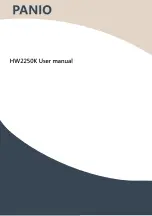
224
9.5 Policy Commands
The 'policy' command set is used in DiffServ to define:
Traffic Conditioning
Specify traffic conditioning actions (policing, marking, shaping) to apply
to traffic classes
The policy commands are used to associate a traffic class, which was defined by the class
command set, with one or more QoS policy attributes. This association is then assigned to an
interface to form a service. The user specifies the policy name when the policy is created.
The DiffServ CLI does not necessarily require that users associate only one traffic class to one
policy. In fact, multiple traffic classes can be associated with a single policy, each defining a
particular treatment for packets that match the class definition. When a packet satisfies the
conditions of more than one class, preference is based on the order in which the classes were
added to the policy, with the foremost class taking highest precedence.
This set of commands consists of policy creation/deletion, class addition/removal, and individual
policy attributes. Note that the only way to remove an individual policy attribute from a class
instance within a policy is to remove the class instance and re-add it to the policy. The values
associated with an existing policy attribute can be changed without removing the class instance.
Note:
Only the most recently added
The CLI command root is
policy-map
.
9.5.1 assign-queue
This command modifies the queue id to which the associated traffic stream is assigned. The
queueid is an integer from 0 to n-1, where n is the number of egress queues supported by the
device.
Format
assign-queue <queueid>
Mode
Policy-Class-Map Config
Incompatibilities
Drop
9.5.2 drop
This command specifies that all packets for the associated traffic stream are to be dropped at
ingress.
Format
drop
Mode
Policy-Class-Map Config
Incompatibilities
Assign Queue, Mark (all forms), Police (all forms)
9.5.3 redirect
This command specifies that all incoming packets for the associated traffic stream are redirected
to a specific egress interface (physical port or port-channel).
Format
redirect <unit/slot/port>
Summary of Contents for DN-80233
Page 1: ...User Manual Dynamic 24 PORT MANAGED GIGABIT SWITCH DN 80233 ...
Page 25: ...24 ...
Page 28: ...27 ...
Page 29: ...28 ...
Page 30: ...29 ...
Page 31: ...30 ...
Page 149: ...148 Default 0 Format vlan priority priority Mode Interface Config ...
Page 224: ...223 Mode Class Map Config ...
















































